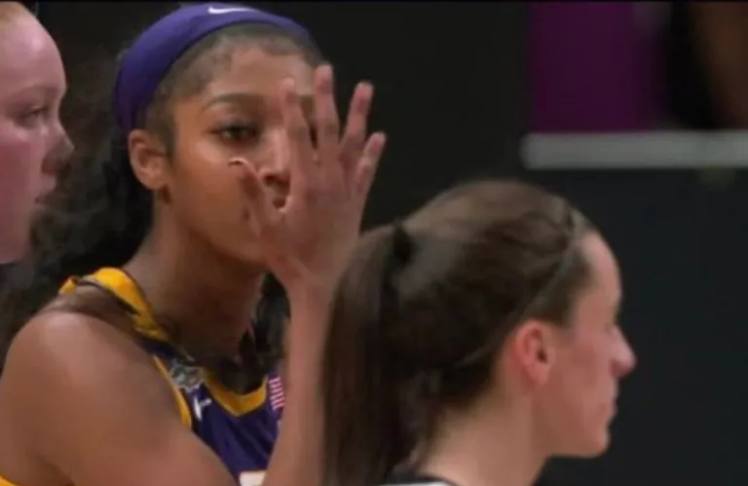
Having been raised in New Orleans until I was 11-years-old, it was quite easy for me to root for the Louisiana State University Tigers on Sunday as they cruised to a 102-85 win over the Iowa Hawkeyes in the Women’s NCAA Championship Game.
It would be disingenuous if I acted as if LSU’s proximity to my hometown was the sole reason I jumped up and down in my living room like my own daughter was wearing purple and gold.
It was more than just LSU’s geography within “The Boot,” as we call it in Louisiana. It was the Black Girl Magic on display. It was the girls with puffy afros, dangling twists, long oversized eyelashes, and lime green sneakers — coupled with the style and swagger to match — that won me over.
There has always been a style to this game that intrigues the folks that look like us. As a member of the 2000 Los Angeles Lakers NBA Championship team, I know firsthand that being great at the game is one thing, but to do it with a style and flair that the Black community is accustomed to is what makes it memorable for us.
It’s the same reason why everyone remembers The Fab Five — when Chris Webber, Jalen Rose, Juwan Howard, Ray Jackson, and Jimmy King shocked the nation by leading Michigan to the championship game in 1992 while donning hip-hop signature long baggy shorts and black socks
It’s the reason we all loved UNLV, when Larry Johnson (sporting a part in the middle of his haircut), Anderson Hunt rocking the high-top fade, and point guard Greg Anthony led their squad to the finals in 1990. You can’t just play the game. For us, you got to walk that walk and talk that talk.
So, it was shocking to wake up Monday morning to people not celebrating the Black Girl Magic on display in the highest-scoring women’s championship game of all time. Instead, I found myself defending a Black girl’s character and how she “conducted” herself on the biggest stage in college basketball. The conversation was a trainwreck of misogyny and covert racism, with the smoke of ignorance billowing in its aftermath.
When Angel Reese did John Cena’s “You can’t see me” hand gesture toward Iowa’s Caitlin Clark, college basketball’s most majestic and dominant player, in the waning moments of yesterday’s championship game, I looked at it as pure expression and the raw emotion of competition.
For Clark, who erupted for a game-high 30 points, hitting eight threes, and setting the record for the most points scored by a player in the tournament in men’s or women’s history, it was simply the repercussion for losing in sports. Sometimes, after someone beats you, they let you know about it. But to some, Reese’s behavior was “embarrassing,” a “disgrace to the sport,” “too ghetto,” and showed a “lack of class.”
Yet, I didn’t know who to attack first.
Some of the folks throwing jabs were men, some even Black men. Yet, we all, whatever culture, embraced Portland Trailblazer guard Damon Lillard when he waved goodbye to Russell Westbrook after nailing the game-winning jumper against the Oklahoma City Thunder in Game 5 of the 2019 playoffs.
We still talk about when Allen Iverson stepped over Tyron Lue in the 2001 NBA Finals, and we replay the former New York Jet Bart Scott’s rant — when he yelled into the camera on national TV after a playoff win that the New England Patriots defense “couldn’t stop a nosebleed.”
Let’s simply admit that we just aren’t ready for women to show that type of emotion. We love seeing our men compete while physically and verbally challenging each other. But for our women athletes? Let’s keep it classy. Let’s keep it meek.
Since when does classy and meek drive people to tune in to sports?
And then there’s the elephant in the room: This was a mostly Black team from LSU, competing in the national championship game against a mostly white team from Iowa.
This is made-for-TV drama, in a country that prides itself as a melting pot, although most of us know that the pot was never quite hot enough.
If it was, then folks would understand that Caitlin Clark didn’t become the best player in college basketball by being a “good sport.” She’s feisty, she’s aggressive, and she knows how to do the “You can’t see me” gesture too. Yet, there was no uproar, no story, not even a social media conversation when she performed the gesture. Maybe it was just a coincidence that nobody paid attention. Or maybe not.
What I do know is we all can’t move the same. We all can’t have the same swag. We all can’t win the game. That’s why we keep score. That’s why some exalt in victory, while others cry in defeat.
Just another day on the block, at the time of year we’ve labeled March Madness. So tell me, why you really mad?
John Celestand is the program director of the Knight x LMA BloomLab, a $3.2 million initiative that supports the advancement and sustainability of local Black owned news publications. He is a former freelance sports broadcaster and writer who covered the NBA and college basketball for multiple networks such as ESPN Regional Television, SNY and Comcast Sportsnet Philadelphia. John was a member of the 2000 Los Angeles Lakers NBA Championship Team playing alongside the late great Kobe Bryant and Shaquille O’Neal. He currently resides in Silver Spring, Maryland, with his wife and son.















